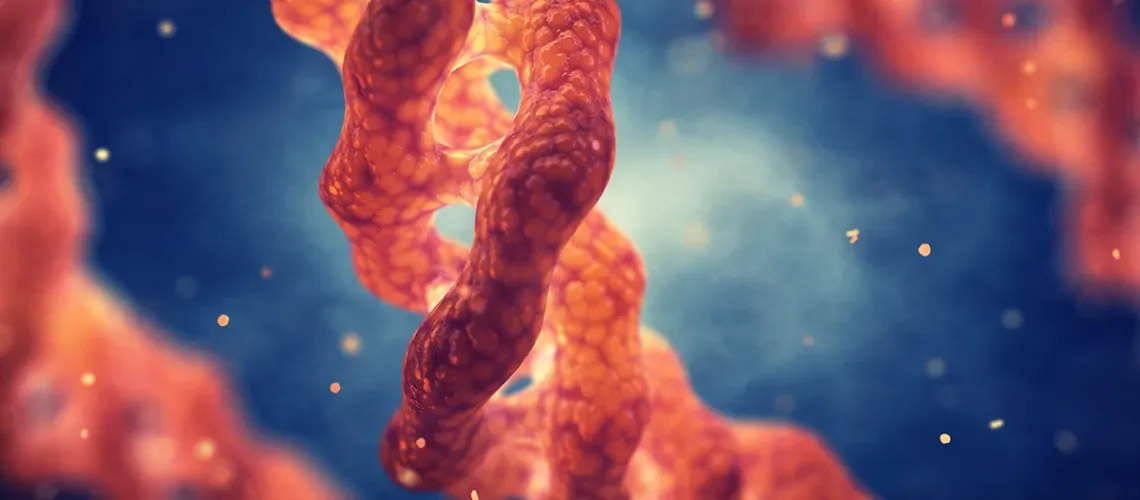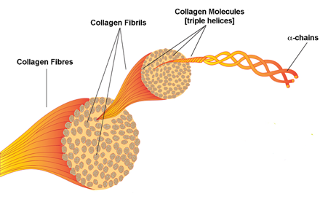
There is mounting evidence, based on clinical trials, to show that oral supplementation with a good quality collagen peptide has benefits in terms of skin, nails, hair and joints. This is especially the case if the peptide is protected from the digestive action of the stomach in order to prevent the breakdown of the peptide into its constituent amino acids.
There are, however, a number of sceptics who state either: that ingesting collagen peptide cannot work or make a difference; or who insist that at least 5 grams of peptide must be consumed daily in order to have an effect. The recently conducted independent clinical trial of Ingenious Beauty [AN3471] shows that neither of these views is valid provided that the collagen peptide is in a protected capsule.
OK, so we know that taking a collagen peptide works. But how does it get your body to produce more collagen?
Fundamentals
First let’s look at some fundamentals about collagen.
Within your body, collagen is found as Collagen Fibres which are made up from a number of Collagen Fibrils. Each fibril consisting of many triple helices of protein molecules, which in turn are made up from amino acids. This structure, which is illustrated in Figure 1, gives collagen the rigidity and resistance to stretching it needs in order to fulfil its role in providing support to the extracellular space of connective tissues. Thus, it is the matrix for skin, tendons, bones, ligaments, and all your organs.

Figure 1 – Collagen Structure
Collagen Synthesis
Collagen, like every other protein in your body, breaks down and is replaced continually. Unfortunately, as we age this process becomes less efficient and the quantity of collagen in your body reduces. This decrease is due to a number of factors: we absorb less nutrients, the energy in our cells – produced by the mitochondria – decreases, and we are bombarded by external pollutants and UV radiation.
Before looking at how collagen peptide supplements can help increase collagen production, we need a basic understanding of how normal collagen synthesis occurs.
Amino acids are the building block of all proteins, and as collagen is a protein it is no surprise that it is made up of amino acids. The primary amino acid sequence being glycine-proline-X or glycine-X-hydroxyproline; where X can be any one of the other 17 amino acids. Note that every third amino acid in this chain is glycine.
Each collagen strand is composed of 3 chains and the chains are wound together to form the unique collagen triple-helix. As glycine is the smallest of the amino acids the chains can be tightly configured thus allowing the whole structure to withstand stress.
Collagen synthesis, the knitting of the amino acids together, occurs in specialist cells called fibroblasts; with most of the synthesis occurring within the fibroblast (intracellular) and final modification, into the different types of collagen, taking place outside the fibroblast.
Collagen Peptide Supplements
OK, but how about the original question. How does taking a collagen peptide supplement get your body to produce more collagen?
Since the seminal Harvard Medical School paper by D. E. Trentham in 1982, there have been hundreds of well researched peer reviewed articles on collagen supplementation and its action on the body.
The consensus of opinion is that collagen production slows from approximately the age of 25 due to an increasing inability to undertake the ‘intracellular’ aspects of synthesis. It is this reduction in production, of what is termed pro-collagen, that collagen peptide supplementation addresses. Three possible mechanisms of action have been postulated and I will discuss each of these in turn.
Collagen peptide (hydrolysed collagen) is rich in the specific amino acids: glycine, proline and hydroxyproline. When taken orally, in an unprotected form, the collagen peptides are broken down into these constituent amino acids, by the digestive action of the stomach, and on reaching the small intestine as free amino acids are absorbed into the blood stream. Through the network of blood vessels, these free amino acids are then distributed throughout the human body; particular to the dermis, where it has been shown they can remain for up to 14 days.
It is argued that this surfeit of amino acids helps overcome the reducing ability of the fibroblasts to produce pro-collagen. However, there are some major flaws in this argument.
Firstly, although providing an additional supply of amino acids may account for the success of a soup made from donkey-hide gelatine (Ejiao) as a beauty aid in Ancient China, it is highly unlikely that anyone, with a first world diet, is short of class 1 protein (meat, poultry & fish) which provide an abundance of amino acids. The only exception to this could be strict vegans. Indeed, if upping your intake of amino acid rich protein was the answer to preventing skin ageing, then rather than supplementing with a collagen peptide we would all be eating an additional steak.
Secondly, if the problem is an age-related reduction in the ability of fibroblasts to produce pro-collagen, it does not follow that a greater availability of raw materials, amino acids, would resolve the problem. Indeed, the recent trial of Ingenious Beauty, which protects the collagen peptide from the digestive action of the stomach, had exceptional results without any increase in amino acid availability.
An early hypothesis was that the very small collagen peptide particles, in the blood, were perceived as pro-collagen enabling the second stage of collagen synthesis to occur without the intracellular stage.
This thinking followed the route for most supplements where the constituents, for example Vitamin C, are used directly by the body. It is also why many collagen peptide supplements emphasis their source collagen type.
A fundamental understanding of the process of collagen synthesis shows that this is the result of flawed logic. Collagen peptide particles having a very different make-up and structure to pro-collagen and, as a result, cannot in any way be used as a substitute.
Evidence used to support this, now discounted theory, was that consumption of carbon14 tagged collagen peptide resulted in the appearance of the carbon14 tagging in the dermis. However, the presence of the carbon14 tagging can also be explained by the third mechanism of action.
Collagen peptides act as ligands (small molecules that transmit signals in between or within cells), binding to receptors present on the fibroblasts’ membrane and stimulate the production of new collagen.
The argument here is that if collagen peptides are absorbed whole into the blood then they are also distributed throughout the body. Again, there is evidence that this occurs as carbon14 tagged collagen peptides have been tracked to the dermis.
In my view, this is the most likely mechanism of action. It supports why Ingenious Beauty, with its protected collagen which does not increase amino acid availability, works and why there is a slight effect from unprotected supplements as a small quantity of undigested collagen peptide may be absorbed into the blood.
So, the truthful answer to the question ‘How do collagen supplements work?’ is that, although we have some interesting theories, no one really knows. This is definitely an interesting area for further research. However, given the latest clinical findings, you can be confident that they do work; especially if the collagen peptide is protected as with Ingenious Beauty.